Whenever the popular press presumes to write with authority about chess, the self-appointed custodians of the game (that’s us) get sniffy, usually with good reason. When chess hits the headlines it tends to trigger a reflex in newspapers. They (tabloids especially) reach for their trusty back catalogue of tired old tropes. Nerds or nutters are name-checked within a couple of paragraphs. A few illustrative anecdotes are lifted from Wikipedia or barrel-scraped from some website and then pasted together using common chess expressions Joe Public will understand. Come to think of it, some chess writers operate in a similar fashion. We’ve all read this type of article: straight out of the hack journo’s handbook.
The press rarely takes chess as seriously as we feel it should. Sad but true. That the UK’s Financial Times should devote one of its influential Special Reports to the game (‘FT Chess’, Thursday 8 October) was a welcome surprise; more than that – it was a cause for celebration.
The FT still commands respect. Of all the broadsheets it is arguably the least tainted by scandal, editorial bias or vested interests. It stands in marked contrast to, say, the right-leaning Wall Street Journal or The Times (London) whose discredited monopolistic owner and disgraced lieutenants are allowed unaccountably to carry on living their charmed lives. Ever since the ‘greed is good’ Gordon Gekko 1980s, the slogan ‘No FT, No Comment’ has delivered its blunt message to businessmen: Read the FT or some corporate killer will have you for breakfast.
The FT retains the loyalty of its well-heeled professional audience by seasoning its daily diet of business news with broad coverage of the arts, culture and leisure. There’s also a weekly supplement advertising fine art, yachts and Caribbean islands, a sort of Exchange and Mart for the super-rich, tempting them to indulge their expensive tastes. The dependable Leonard Barden has written its weekly chess column for 35 years.
The Times employs some excellent writers but only a P45 can rescue its chess column from the neglect that has made it a standing joke for thirty years.
But I digress. How did the FT use its four big, well-designed and expensive broadsheet pages to survey our game? To find out you will need to take out a trial subscription or visit your local library (if you still have one), because the report isn’t freely available online. In the meantime let’s peek through the crack in the FT’s paywall. 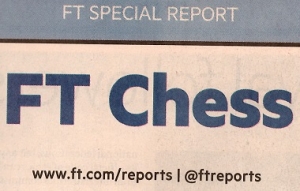
in headlines and straplines
Page 1
Internet speeds sport’s growth
‘The latest technological revolution has provided big online opportunities for players, fans and business, writes Adam Thomson’
A sound overview of the online growth of chess featuring interviews with chess tutor Christof Sielecki, Chess.com founder Daniel Rensch, Malcolm Pein and John Nunn.
Technology aids cheats but also helps root them out
‘Competition fraud: Powerful statistical tools can spot sudden improvements in a player’s performance, writes James Crabtree’
A roundup of the main chess cheating scandals concludes that ‘brazen cheats are fairly easy to unmask’. Comments from Vishy Anand and Daniel King.
Quarter page ad for Legacy Square Capital, ‘one of the leading experts in investing in Russia and CIS countries’.
Page 2
Politics divides loyal followers
World governing body
‘The re-election of Fide’s president has not stopped calls for reform, writes James Crabtree’
Some sharp insights but Mr Ilyumzhinov emerges largely unscathed beyond being compared with Sepp Blatter. Indeed he’s described as ‘charming’ and ‘a natural politician’. The darker allegations against him are invisible. Kasparov’s political skills, on the other hand, are found wanting: 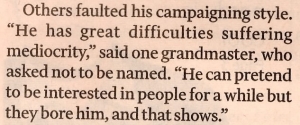 Perhaps the FT doesn’t want to risk upsetting some of its friendlier Russian oligarchs.
Perhaps the FT doesn’t want to risk upsetting some of its friendlier Russian oligarchs.
Chessbase: Software company in cloud move
This sweep of the software firm’s history and growth contains the bold claim that ‘Chessbase is largely credited with having democratised chess as it gives anyone who has a laptop and a couple of hundred euros instant access to practically every top-level game ever played.’ That could have been dictated by the company’s marketing manager. Co-founder Matthias Wüllenweber takes an unexpected stance on piracy: ‘We always liked piracy because people grew to love our software in countries where we would never have sold a single copy anyway.’
Search is on for sponsors with deep pockets
Corporate support
‘Despite a huge following, big backers are staying way, reports Adam Palin’
Full marks to the writer for giving golf and chess a comparative health check: it’s a good place to begin. Sadly it’s not long before he sets off Mr Horton’s well-tuned bullshit detector by referring to that statistic AGON plucked from the air. 
Page 3
Young Champ who is happy to be viewed as a nerd
Interview
‘Aged just 24, Magnus Carlsen is seen as a boost to the game’s image, says Adam Thomson’
The most newsworthy piece in the report starts inauspiciously with the interviewer competing with a smartphone for the world champion’s attention. The conversation picks up when the subject turns to the world championship system and, inevitably, nerds (kudos to the FT for filling three pages before mentioning the word).
Britain needs to rise to global challenge
OPINION
Nigel Short
A critical, well-written overview of Britain’s rise and stagnation in world chess. ‘The UK government does not recognise chess as a sport, so starving it of funds.’
Quarter page ad for World Chess Rapid and Blitz Championship
Page 4
Chequered board can improve children’s lives
Education
‘Supporters say the game teaches logical thinking and concentration, says John Thornhill’
A measured and cautious review of the evidence to support the case that chess can benefit children’s education that ends with a sceptical swipe at Kasparov’s How Life Imitates Chess.
Game, net and match Website for would-be players proliferate
Most of the usual suspects are here, regrettably all playing sites. There ought to be a section on other web resources and blogs, The Week In Chess, S&B blog and Edward Winter’s Chess Notes, to name a few.
Film-makers take cue from great game
Cinema
‘The thriller genre and chess make a perfect match, writes Adam Jezard’
An interesting subject badly served here by trite writing. It’s little more than a list of films and plot lines framed by a single banal argument: chess is cinematic shorthand for scheming. The article might have been enhanced by being abridged to those six words above a quarter-page ad for Pawn Sacrifice. Would have made more commercial sense too.
As for pure chess content, there are four positions to solve: ‘Checkmates that you should know’, Anastasia’s, Philidor’s etc.
FT readers looking for some insight into the game’s rich history and literature (or even resources to guide them) will be sadly disappointed.
So there you have it, a quick digest of the FT’s take on chess. It’s well worth seeking out the full report.
A final word to the world champion, who had the best line of all:
‘I am not only a chess player, I am a chess fan and a chess nerd. I want to follow everything that happens.’

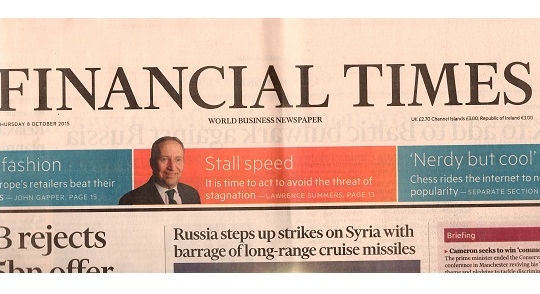
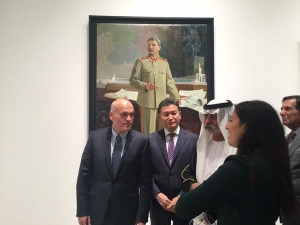
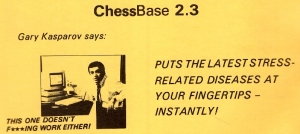
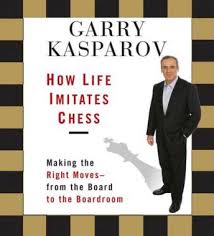


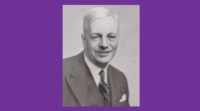
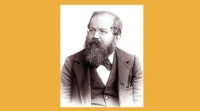

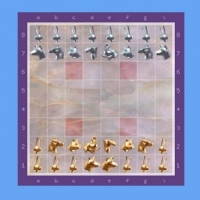

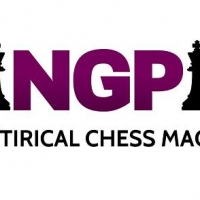
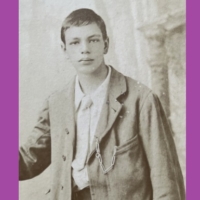
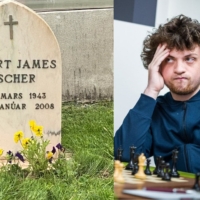
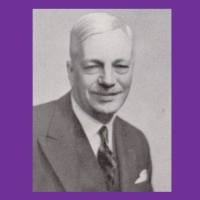
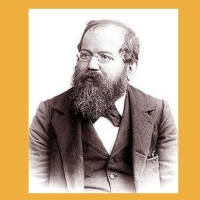
Chess and Business will be an annual happening!
From Annex 54, the AGON report to FIDE at Abu Dhabi by Merenzon.
2. The Financial Times and Chess
We have agreed that the Financial Times will publish an annual section called ‘Chess
and Business’. The first installment will be published on October 8, 2015, a day before
opening of the Rapid and Blitz Championship. The section will have 4 pages of
interviews and editorials about chess and how it affects global culture. Until chess, the
newspaper had only one section dedicated to sport – it was Formula1.
Presence in the Financial Times is really good for chess, as the elite audience of over 1
million people who read the Financial Times see that chess is a major part of the global
business life. It’s also good for sponsors who support chess and can place
advertisements in a section dedicated to the sport they support and love. Once the
first installment is published, we’ll send it to all members of the Presidential Board.